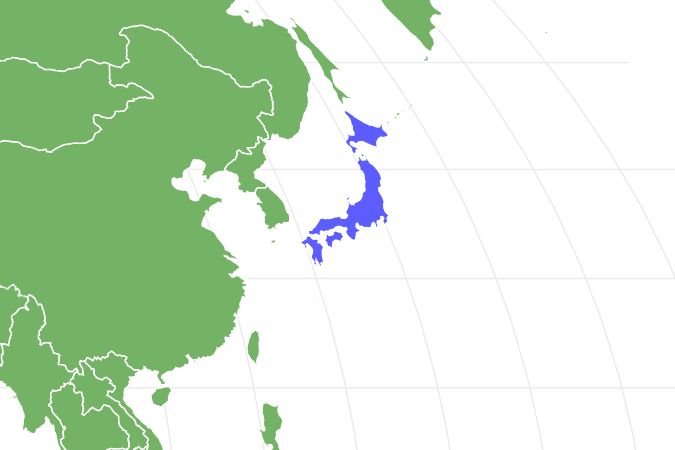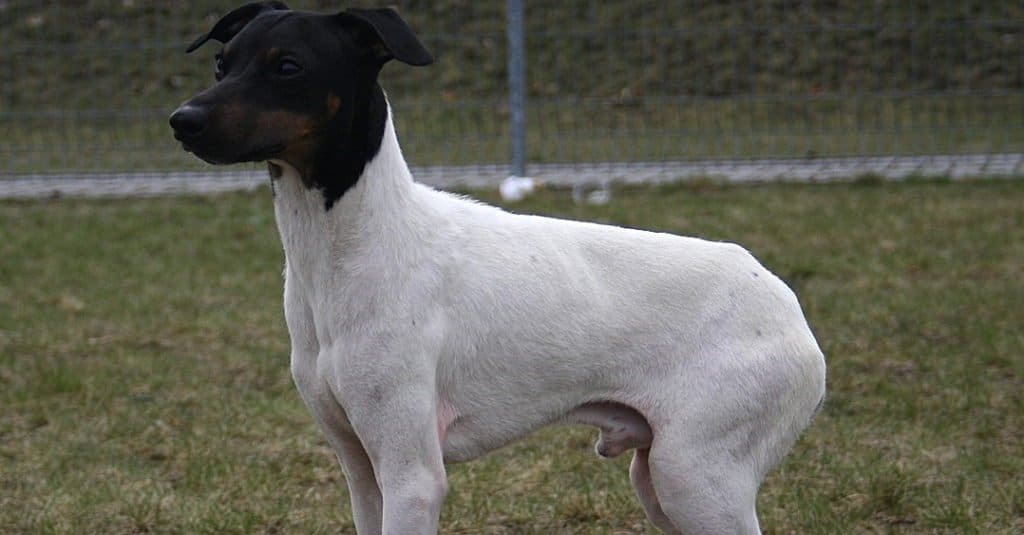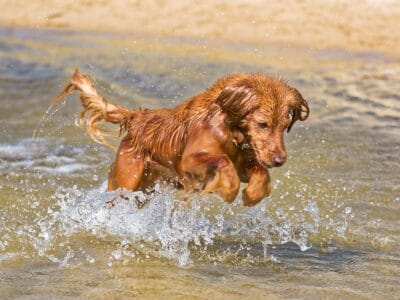Japanese Terrier
Canis lupus
Japanese Terriers are also called Nippon Terriers
Advertisement
Japanese Terrier Scientific Classification
- Kingdom
- Animalia
- Phylum
- Chordata
- Class
- Mammalia
- Order
- Carnivora
- Family
- Canidae
- Genus
- Canis
- Scientific Name
- Canis lupus
Read our Complete Guide to Classification of Animals.
Japanese Terrier Conservation Status
Japanese Terrier Facts
- Diet
- Omnivore
Japanese Terrier as a Pet:
- General Health
- Energy Level
- Shedability
- Trainability
- Intelligence
- Tendency to Chew
- Size
- Family and kid friendliness
- Yappiness / Barking
- Moderate
- Separation Anxiety
- High
- Preferred Temperature
- Average climate
- Exercise Needs
- High
- Friendly With Other Dogs
- High
- Pure bred cost to own
- $600 to $800
- Dog group
- Terrier
- Male weight
- 5-10 lbs
- Female weight
- 5-10 lbs
This post may contain affiliate links to our partners like Chewy, Amazon, and others. Purchasing through these helps us further the A-Z Animals mission to educate about the world's species.
View all of the Japanese Terrier images!
Japanese Terriers are also known as Nippon Terriers. They are very lovable and affectionate, making them excellent additions to any family.
Japanese Terrier dogs are small-sized dogs with short coats. These dogs are clean-cut and have a smart appearance and a compact outline.
See all of our expert product reviews.
Japanese terriers are cheerful dogs and are very intelligent in nature. They are gentle and can also be cautious sometimes. However, while chasing squirrels, they can get intense.
These dogs were bred with small pointers and native dogs after the smooth fox terrier was imported from Japan to the Netherlands in the seventeenth century. These dogs are not hypoallergenic.
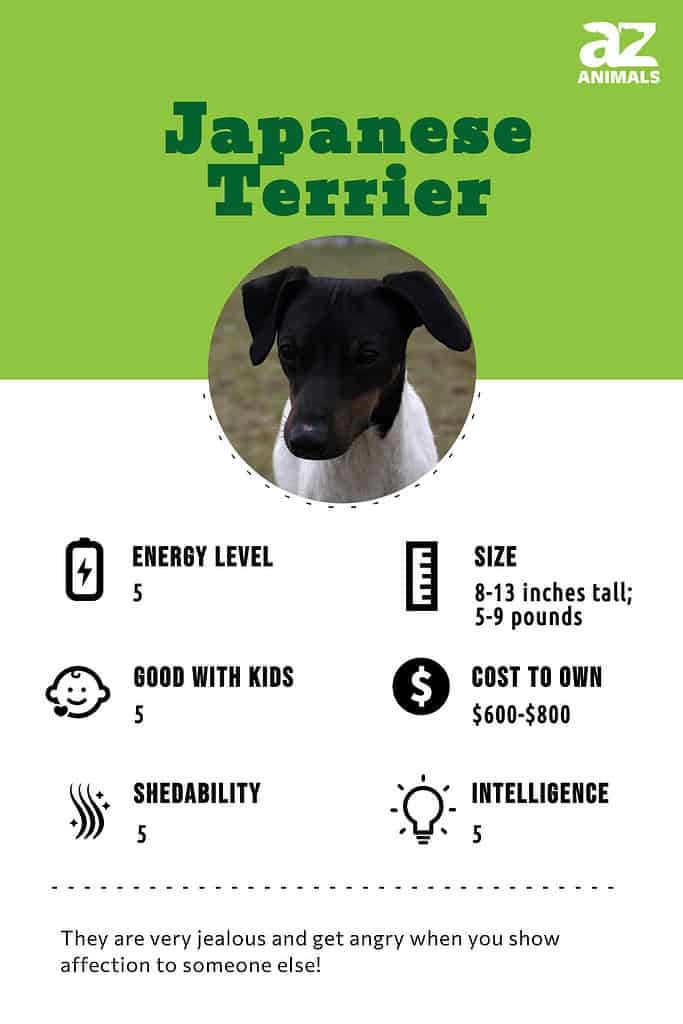
3 Pros And Cons Of Owning A Japanese Terrier
Every pet comes with its own set of pros and cons but having a realistic idea of their personality and behavior makes a big difference. Let’s take a look at what you can expect from a Japanese Terrier.
| Pros! | Cons! |
|---|---|
| Sweet: These dogs are gentle and sweet in nature and are generally very cheerful. | Shedding: These dogs are not hypoallergenic. Though their grooming is minimal, they tend to shed year-round, which could become problematic for individuals with allergies. |
| Intelligent: If you are looking for an intelligent pet, this would be a great choice to make. | Exercise needs: Japanese terriers need a lot of exercise despite being small in size. If the owner likes a more relaxed lifestyle, meeting the needs could still be a problem. |
| Easy grooming: These dogs do not need extensive grooming, ensuring that they have relatively low maintenance | Health concerns: These dogs do suffer from certain health concerns which could be difficult to handle. |
History Of The Breed
The smooth-haired fox terrier was imported to Japan in the 17th century by Dutch merchant ships and bred with small pointers as well as native-type dogs, which eventually brought about the Japanese terrier. The early mix of the breeds was called Kobe terriers, and the planned breeding did not begin until the 1920s. The current breed type was defined around 1930, which is when they were recognized by the Japanese Kennel Club. Although they were originally bred to hunt small game, they were, and still are, mainly kept as lap dogs.
Health and Entertainment for your Japanese Terrier
See all of our expert product reviews.
Size and Weight
Japanese Terrier is a small-sized dog. They are about 8 to 13 inches in length, weighing just about 5 to 9 pounds.
| Height (Male) | 8-13 inches tall |
| Height (Female) | 8-13 inches tall |
| Weight (male) | 5-9 lbs., full-grown |
| Weight (female) | 5-9 lbs., full-grown |
Common Health Issues

Eye and ear infections are relatively common for this breed.
©Oakland Images/Shutterstock.com
As small as the Japanese terrier is, you still need to watch out for potentially harmful conditions that impact them. Most of these health conditions are not life-threatening, but they still need medical attention.
Eye and ear infections are relatively common for the Japanese terrier, including pink eye (inflammation that impacts the conjunctiva). They can also get an infection in the ear with scratches or scabs that do not heal properly.
Patellar luxation is also a common problem, which is essentially a dislocated knee. The terrier will show that they have experienced this dislocation by limping, protecting themselves from putting pressure on the limb.
Overall, the health problems that Japanese Terrier dogs suffer from include:
- Eye problems
- Ear infections
- Injuries due to their small size
- Patellar Luxation
Temperament
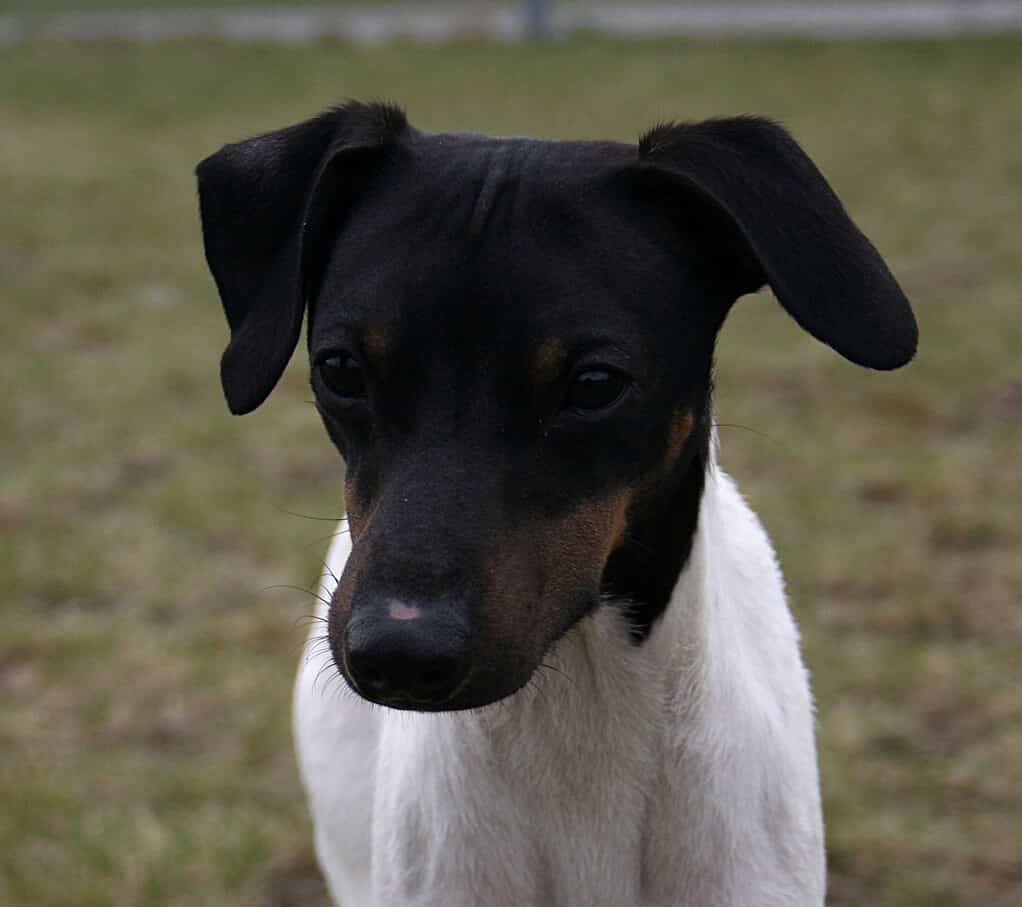
This breed loves attention and is incredibly loyal.
©Pleple2000, CC BY-SA 3.0 <https://creativecommons.org/licenses/by-sa/3.0>, via Wikimedia Commons – Original / License
Japanese Terrier dogs are known to be cheerful, active, and lively. They are good-spirited dogs that exhibit incredible intelligence with the love and affection they provide their owners. With some cuddling and affection in return, the Japanese terrier can be quite the happy pup. They love attention and do not like being left alone for long periods of time.
This species is incredibly loyal and devoted to any family that they bond with. They tend to become attached to one person over the others in a family and can eventually turn possessive of that person. Sometimes, the possessiveness can escalate so much that they will grow impatient and annoyed if their chosen loved one gives another attention.
These dogs are generally gentle though they can also become cautious and nervous around others. Their sensitive temperament may not be suited for homes with a lot of arguments or stress. It is cautious as well as mindful of strangers but rarely turns aggressive around them. Once these dogs get to know a stranger, they will turn loving towards them.
These dogs also love their toys and can usually be found lying in the middle with their toys spread around them.
How To Take Care Of A Japanese Terrier
Before bringing any new animal home, make sure to understand the pup’s needs to keep them happy, healthy, and thriving. Here are a few tips to make caring for a Japanese terrier.
The Best Dog Food For Japanese Terriers
Always feed your Japanese Terrier high-quality dry dog food. These dogs would need anywhere between half to one and a half cups of this food every day since their small stomach can only fit so much food at once. It is easy to divide the food into two meals daily. Keep a steady supply of fresh water available at all times to prevent dehydration.
A-Z Animals believes the best dog food for Japanese Terriers is Purina Pro Plan Small Breed & Toy Breed Formula Adult Dry Dog Food.
All wrapped in small enough bites for your petite buddy, a hearty chicken and rice combo includes a balance of phosphorus and calcium for the bones and cartilage, plus glucosamine for extra joint support. Live probiotics promote a robust immune system from the inside out by aiding digestion with vitamin A for clear eyes.
Check Chewy or Amazon for this product.
- Shredded Blend Chicken & Rice Formula with probiotics for small dogs
- Fortified with probiotics for digestive and immune health
- Calcium, phosphorus and other minerals maintain strong bones and teeth
- Prebiotic fiber from wheat bran for digestive health
Maintenance And Grooming
Grooming for Japanese Terriers is usually not very laborious or cumbersome. Their grooming needs are low to moderate, though they shed through every season. Expect to brush them consistently to prevent the fur around the home. Brushing once or twice weekly is enough to make a big difference. Plus, it eliminates any dirt and debris that builds up in the coat.
These dogs should be bathed on an as-needed basis, and users should exclusively use a shampoo that is appropriate for a dog’s coat. Bathing too frequently can lead to dryness in their fur and skin. Check their ears at least once a week for any possible infections or abrasions. To wipe them clean, use a damp cloth and water or a cotton ball with an ear-cleaning solution.
Make sure to brush the teeth of your Japanese Terrier about 2 to 3 times per week and would need to trim their nails periodically.
Training
Training a Japanese terrier is not a difficult job. Remember to stay positive and gentle with the dog in these commands without forgoing a firm tone. Consistency is key with these dogs. They also love to learn new tricks to please their owner. If you want them to maintain good and healthy habits, introduce them to older dogs in the home or your area to socialize them.
Exercise
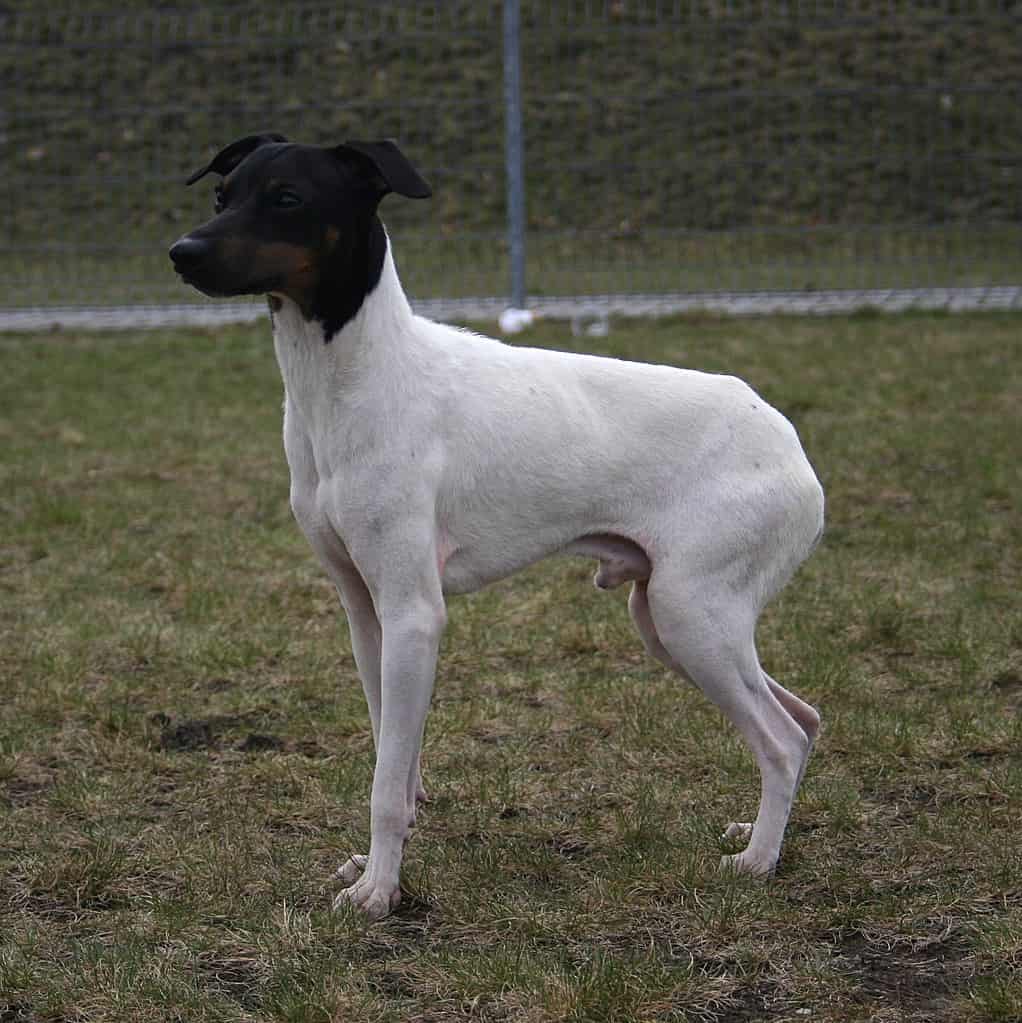
Japanese Terriers are very active and need plenty of exercise.
©Pleple2000, CC BY-SA 3.0 <https://creativecommons.org/licenses/by-sa/3.0>, via Wikimedia Commons – Original / License
Even though these dogs are small in size, they are very active and would need a lot of exercise. Take your Japanese terrier out for multiple short walks or let it play in the yard. If you’re up for the challenge, let loose with a good run a couple of times per week.
While indoors, these dogs can also manage to entertain themselves sufficiently and can also be good apartment dogs. A small yard would always be a bonus for them. Extreme temperatures are not appropriate for the Japanese terrier’s health, so take them out when the temperature is moderate to protect their feet and immune system.
Puppies
Japanese Terrier puppies would need to be taken care of with many of the same actions that an adult would. Puppies will also need their food divided into far more foods than what you do for the adult. This is because their small stomachs can’t take and digest large quantities of food at once.
Japanese Terriers And Children
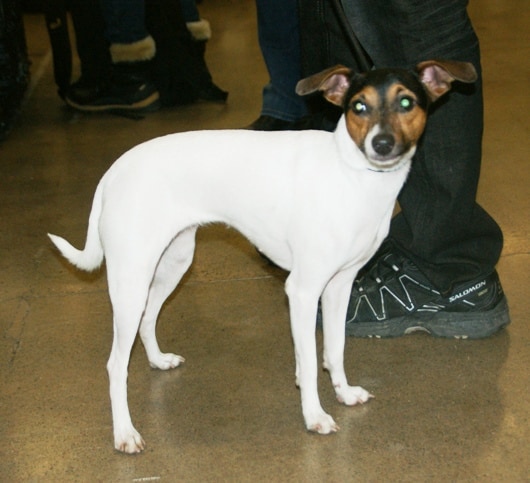
Japanese Terriers are a great family dog but due to their small size, they can get hurt easily.
©Canarian, CC BY-SA 3.0 <https://creativecommons.org/licenses/by-sa/3.0>, via Wikimedia Commons – Original / License
Japanese Terriers are great around children of the family. However, due to their tiny size, they can easily get hurt and could be a problem around smaller kids in the house. As long as your kids are old enough to be careful around the dog, this dog should be very playful and affectionate towards them.
Dogs Similar To Japanese Terriers
As wonderful as the Japanese Terrier is, this pup may not be the right animal for every household. If you are still set on having a dog, these breeds are similar to the terrier.
- Akita: These dogs are also small. They are loyal and affectionate towards their owners and are known to be courageous.
- Shiba Inu: One of the native dogs from Japan, Shiba Inus are playful and makes great family pets.
- Cairn Terrier: Another small dog breed, these dogs make excellent watchdogs and do not shed too much.
Famous Japanese Terriers
As sweet and loving as these dogs are, the Japanese terrier hasn’t quite made any headlines with famous owners or guest appearances in film or television.
Popular Names For The Japanese Terrier
Many names can suit the Japanese Terrier appropriately, including:
- Charlie
- Molly
- Riley
- Cookie
- Beau
Japanese Terrier FAQs (Frequently Asked Questions)
What is a Japanese terrier?
A Japanese terrier is a small-sized cheerful dog with a short coat. It was bred with small pointers and native dogs after the smooth fox terrier was imported from Japan to the Netherlands.
How big is a Japanese terrier?
Japanese Terriers are 8 to 13 inches in size.
What is the lifespan of a Japanese terrier?
The lifespan of a Japanese Terrier is about 12 to 15 years.
Are Japanese terriers good family dogs?
Yes, Japanese Terriers make great family dogs. They are loyal and affectionate towards their owner and their families.
Do Japanese terriers shed?
Yes, Japanese Terriers shed all year long.
How much does a Japanese terrier cost to own?
The average price to adopt a Japanese Terrier would be around $600 to $800. There are also grooming costs, veterinary fees, and other expenses to consider each year, adding up to an additional price of $1,500.
Thank you for reading! Have some feedback for us? Contact the AZ Animals editorial team.
Sources
- Dog Breeds List / Accessed March 27, 2021
- Dog Breed + / Accessed March 27, 2021
- ACVS / Accessed March 27, 2021
- Wikipedia / Accessed March 27, 2021
- Pet MD / Accessed March 27, 2021
- American Kennel Club / Accessed March 27, 2021

